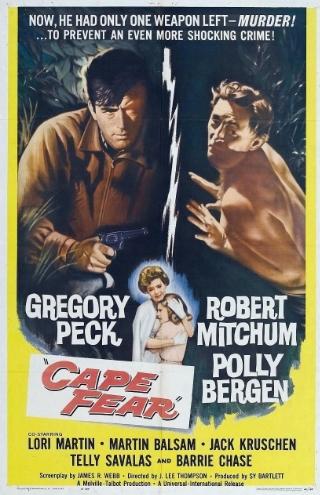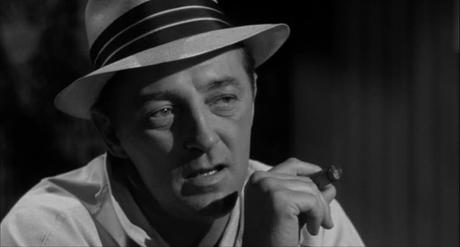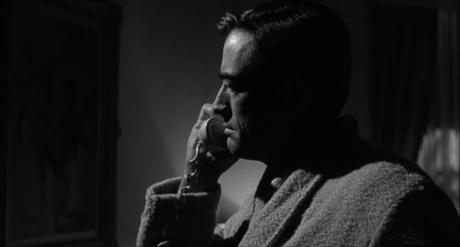
Recently, I wrote about Brainstorm, commenting on its connections to classic film noir. Another movie from the same decade, albeit a few years earlier, with an arguably stronger affiliation to the world of noir is Cape Fear (1962). Sourced from the hard-boiled, pulpy writing of John D MacDonald, the film is a merciless examination of some of the darkest areas of human nature. While almost all the varied aspects of the filmmaking process, and the artists and craftsmen involved, blend together to produce the finished product, much of its power derives from the central performance of Robert Mitchum. For a man who initially didn’t want to do the picture, Mitchum fully inhabits his part and brings a level of feral brutality to the character that makes Max Cady one of the most memorable and formidable villains the screen has known.
The story is a relatively simple tale of revenge and retribution, a face-off not only between the principal characters but between the law and justice too. Sam Bowden (Gregory Peck) is a successful lawyer, married with a teenage daughter and living in some comfort. A typical noir scenario frequently sees the protagonist cornered by circumstance, and what better way to achieve that than to have the past come crashing violently into the present. In Sam Bowden’s case the unwelcome past is represented by the swaggering, cigar-chomping figure of Max Cady (Robert Mitchum), a man who’s spent eight years in prison on the basis of Bowden’s testimony against him. The question of his own guilt doesn’t occur to Cady, he simply regards himself as a victim of Bowden’s meddling and is thus intent on exacting vengeance for what he considers a life denied him. From his first encounter with Bowden outside the courthouse, a mock affability barely concealing his threats, Cady becomes omnipresent in the attorney’s life. Everywhere he goes, his arrogant nemesis seems to follow, and the veiled intimidation is gradually cranked up with each successive meeting. With the danger to his family becoming ever more apparent, Bowden turns to his friends in the police department in the hopes of using his establishment connections to rid himself of Cady. However, if he thinks he can bend the law to his benefit, he soon finds out how mistaken that assumption is – Cady is clever, cunning and more than capable of turning the tools of Bowden’s trade back on him. Bit by bit, the lawyer is drawn, through mounting desperation, towards that fine line between legality and criminality. Ultimately, Cady’s goading will lead him right up to the rim of the moral abyss and dare him to take that final fateful step.

J Lee Thompson had begun his directing career in British cinema a decade earlier and had made a number of films which showed he had a talent for both action and suspense. While working on The Guns of Navarone, he so impressed star Gregory Peck that he was promptly asked to take charge of this film. There are action sequences in Cape Fear, particularly during the harrowing climax, but it’s primarily a suspense picture, a dread infused journey of terror and moral compromise. As Bernard Herrmann’s ominous score pounds away, Thompson smoothly dials up the tension in tantalizing increments – clever cutting and camera setups lending an air of danger to such mundane and traditionally secure settings as the family home and the daughter’s school. And cameraman Sam Leavitt plays his part too, alternating between the sun drenched Savannah locations where Sam Bowden walks tall and proud as a leading citizen, and the inky shadows of his home and later the river as his thoughts turn to subverting the law which he serves in order to protect his family.
I said at the start that Cape Fear is a film which benefits from fine work all round. Peck was always good at portraying upright, heroic types. The role of Sam Bowden was a comfortable fit for him, and he catches the slight stiffness that makes the character ever so vaguely unlikable very well; Peck had the ability to convey a kind of prim smugness at times, a quality which fits in nicely in the early stages when he’s calling in favors from Martin Balsam’s accommodating police chief in an effort to run Cady out of town. I found it interesting that Lee Server’s biography claims Mitchum regarded the Peck character as the bad guy until the brutality of the second half of the film clarifies matters. Actually, it not so hard to see where he was coming from with that theory as story has the establishment figures closing ranks against the outsider in the early stages. Of course the full extent of Cady’s depravity and ruthlessness is starkly revealed as the story unfolds, but that faint touch of ambiguity at the beginning adds further interest to my mind.

Regardless of the solid work from Peck, Polly Bergen, Telly Savalas, Lori Martin, Barrie Chase et al, it’s really Mitchum’s show all the way. He’d proved how well he could take on villainous roles in Charles Laughton’s dreamy and magical The Night of the Hunter but I feel playing Max Cady saw him step up to another level altogether. He’s genuinely electrifying every time he appears on screen, strutting and swaggering and dominating every frame with his sheer physicality. To refer again to the Server biography, it’s said that he invested himself in the role so deeply that he terrified Barrie Chase – something that’s clearly visible in the movie itself – and almost had to be restrained during the climactic assaults on both Bergen and Peck. The film was remade 30 years later by Martin Scorsese, with Robert De Niro as Cady, and featuring cameos by both Mitchum and Peck, but it didn’t work anywhere near as well for me. That remake, despite attempts to add some intriguing new aspects to the characters’ relationships, suffers badly from a cartoonish performance by De Niro that pales before the raw dynamism of Mitchum’s work – the sheer primal power of the man burns itself into your memory.
I just recently watched the film again on Blu-ray, which I picked up bundled with the remake for a very good price, and it benefits from the increased resolution but not in any startling way. If Cape Fear isn’t generally referred to as film noir, then it comes awfully close as far as I’m concerned. It’s dark, brooding and tough – the ending does see justice prevail, just, but it comes at a heavy price and nobody really walks away unscathed. For anyone laboring under the illusion that Mitchum tended to phone in his performances, or that J Lee Thompson was simply Cannon fodder, Cape Fear ought to put those myths permanently to rest.
